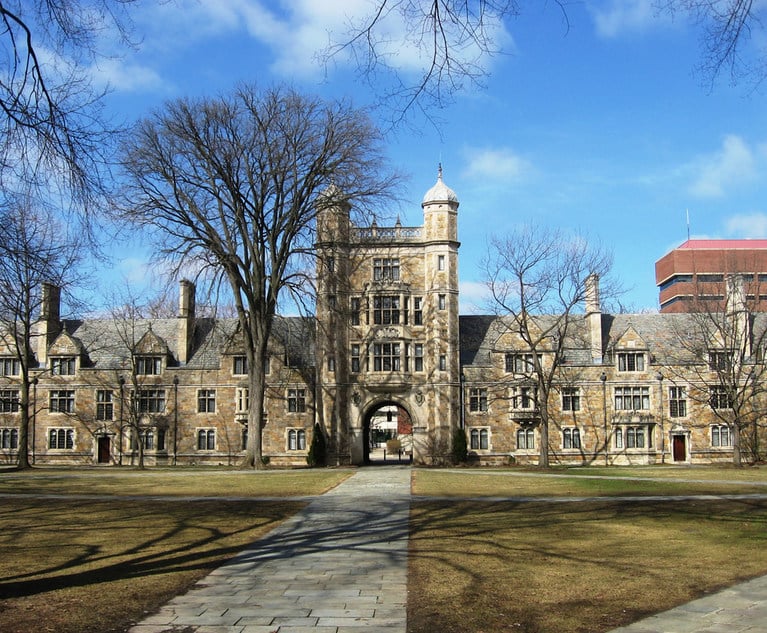This Firm Is Giving $110K Signing Bonuses to Federal Clerks: The Morning Minute
The news and analysis you need to start your day.
March 22, 2022 at 06:00 AM
6 minute read

Want to get this daily news briefing by email? Here's the sign-up.
WHAT WE'RE WATCHING
CASH 4 CLERKS - A federal clerkship is a good gig if you can get it. Yesterday, litigation-focused Am Law 200 firm Boies Schiller Flexner revealed that it would be offering a $110,000 signing bonus to federal law clerks this year, Law.com's Bruce Love reports. In a letter to clerks from managing partners Matthew Schwartz, Sigrid McCawley and Alan Vickery, obtained by Law.com, the firm wrote that "because judicial clerks are crucial to our success, BSF has increased the signing bonus for all federal district and appellate law clerks to $110,000 for one clerkship." The managing partners went on to say that clerks joining the firm can choose their own compensation structure, electing between BSF's "formula compensation," which the firm says often results in "performance-based bonuses surpassing the market," or the firm's "market compensation system" that pays "top-of-market salaries." The $110,000 signing bonus is believed to be at the higher end of bonuses for a federal clerkship, which tend to average around $50,000-$75,000 in Big Law.
SMALL CHANGE - Corporate legal departments with 10 or fewer attorneys are finding that moving the needle on diversity comes with plenty of challenges. As Law.com's Trudy Knockless reports, those often range from having fewer resources for recruiting and lower pay scales to just not having enough positions on staff for minorities of similar backgrounds to build a sizable community. "If you have very small departments, then you have more limited opportunities to include each of those as a dominant diversity," said Melba Hughes, national in-house diversity practice leader at Major, Lindsey & Africa. Still, some legal departments have found ways to make those limited opportunities count. "The ability for everyone to generally know each other better and have more regular interactions gives smaller legal departments the nimbleness" to change course quickly and operate more effectively, said Stephen Kim, chief legal officer of Avicanna, which is developing cannabis-based medical products. Kim said that to fill a recent opening, he targeted smaller law schools, alumni of historically black colleges and universities, as well as affinity groups for lawyers of various diverse backgrounds.
WHO GOT THE WORK?℠ - Krystal B. Swendsboe and Rebecca L. Saitta of Wiley Rein have stepped in to represent Koonz, McKenney, Johnson & Depaolis in a pending lawsuit. The action, filed Jan. 31 in the District of Columbia District Court by Goodell Devries Leech & Dann on behalf of former Koonz McKenney partner William P. Lightfoot and May Lightfoot PLLC, contends that defendant accessed William Lighfoot's 'google my business' account on several occasions in an alleged attempt to divert business. The case, assigned to U.S. District Judge James E. Boasberg, is 1:22-cv-00238, Lightfoot et al v. Koonz, Mckenney, Johnson & Depaolis LLP. >>Read the complaint on Law.com Radar and check out the most recent edition of Law.com's Who Got the Work?℠ column to find out which law firms and lawyers are being brought in to handle key cases and close major deals for their clients.
FINANCIAL DISSERVICES? - Banco Santander, a Spanish commercial bank and financial services company, and other defendants were hit with a civil RICO lawsuit Sunday in California Northern District Court. The suit, filed by attorney Andrew G. Watters on behalf of Filomeno Medina and Arlene Valdefiera, contends that a group of individuals are using a retired attorney's information to scam plaintiffs into sending fees to Mexico for a timeshare in Cancun, Mexico. The suit further contends that Banco Santander and other defendants have knowledge of the ongoing scam and have failed to stop it. Counsel have not yet appeared for the defendants. The case is 3:22-cv-01762, Medina et al v. Newfold Digital, Inc. et al. Stay up on the latest deals and litigation with the new Law.com Radar.
EDITOR'S PICKS
WHILE YOU WERE SLEEPING
NOT SO FAST - For many international law firms, the decision to pull out of Russia was a difficult one. Now comes the really hard part. One employment partner for a U.S. firm in London told Law.com International's Jack Womack they believe firms face a monumental challenge in figuring out what to do with their people. While lawyers in either Moscow or St. Petersburg who are overseas citizens or working there on secondment will most likely be relocated elsewhere, the partner said there is a trickier issue when it comes to staff on the ground who are Russian. "Some firms will relocate their personnel to other regions, and some won't. For the lawyers [in Russia] who don't get relocated, the two fundamental questions for firms are—what do you pay them, and how do you pay them?" Another London-based employment head said it's remarkable how quickly international firms have withdrawn from Russia, given that the conflict in Ukraine is not even a month old: "When the dust starts to settle, we might see firms start to go back in. If there is a ceasefire and a more permanent kind of peace, we may see the business world moving relatively quickly back to where it was. Firms might regret being so emphatic right now—and look to revisit their decisions."
WHAT YOU SAID
"This was one of those opportunities where the mission is so in line with who I am as a person."
— Karim Marshall, on being named the first-ever GC of the nonprofit Juneteenth Foundation.
This content has been archived. It is available through our partners, LexisNexis® and Bloomberg Law.
To view this content, please continue to their sites.
Not a Lexis Subscriber?
Subscribe Now
Not a Bloomberg Law Subscriber?
Subscribe Now
NOT FOR REPRINT
© 2025 ALM Global, LLC, All Rights Reserved. Request academic re-use from www.copyright.com. All other uses, submit a request to [email protected]. For more information visit Asset & Logo Licensing.
You Might Like
View All

From Laggards to Tech Founders: Law Firm Innovation Is Flourishing

Inside Track: Cooley's Modest Proposal to Make Executives Safer

Law School Applications are Up Across the Country. Law Deans Aren't Sure Why
6 minute readLaw Firms Mentioned
Trending Stories
- 1Judge Rules Georgia Railroad Can Seize Land as Landowners Vow to Fight
- 2On the Move and After Hours: Einhorn Barbarito; Gibbons; Greenbaum Rowe; Pro Bono Partnership
- 3On The Move: Squire Patton Boggs, Akerman Among Four Firms Adding Atlanta Partners
- 4Is the Collateral Order Doctrine About to Have a 'Brat Summer'?
- 5Trump Administration Faces Lawsuit Over USAID Stop-Work Orders
Who Got The Work
J. Brugh Lower of Gibbons has entered an appearance for industrial equipment supplier Devco Corporation in a pending trademark infringement lawsuit. The suit, accusing the defendant of selling knock-off Graco products, was filed Dec. 18 in New Jersey District Court by Rivkin Radler on behalf of Graco Inc. and Graco Minnesota. The case, assigned to U.S. District Judge Zahid N. Quraishi, is 3:24-cv-11294, Graco Inc. et al v. Devco Corporation.
Who Got The Work
Rebecca Maller-Stein and Kent A. Yalowitz of Arnold & Porter Kaye Scholer have entered their appearances for Hanaco Venture Capital and its executives, Lior Prosor and David Frankel, in a pending securities lawsuit. The action, filed on Dec. 24 in New York Southern District Court by Zell, Aron & Co. on behalf of Goldeneye Advisors, accuses the defendants of negligently and fraudulently managing the plaintiff's $1 million investment. The case, assigned to U.S. District Judge Vernon S. Broderick, is 1:24-cv-09918, Goldeneye Advisors, LLC v. Hanaco Venture Capital, Ltd. et al.
Who Got The Work
Attorneys from A&O Shearman has stepped in as defense counsel for Toronto-Dominion Bank and other defendants in a pending securities class action. The suit, filed Dec. 11 in New York Southern District Court by Bleichmar Fonti & Auld, accuses the defendants of concealing the bank's 'pervasive' deficiencies in regards to its compliance with the Bank Secrecy Act and the quality of its anti-money laundering controls. The case, assigned to U.S. District Judge Arun Subramanian, is 1:24-cv-09445, Gonzalez v. The Toronto-Dominion Bank et al.
Who Got The Work
Crown Castle International, a Pennsylvania company providing shared communications infrastructure, has turned to Luke D. Wolf of Gordon Rees Scully Mansukhani to fend off a pending breach-of-contract lawsuit. The court action, filed Nov. 25 in Michigan Eastern District Court by Hooper Hathaway PC on behalf of The Town Residences LLC, accuses Crown Castle of failing to transfer approximately $30,000 in utility payments from T-Mobile in breach of a roof-top lease and assignment agreement. The case, assigned to U.S. District Judge Susan K. Declercq, is 2:24-cv-13131, The Town Residences LLC v. T-Mobile US, Inc. et al.
Who Got The Work
Wilfred P. Coronato and Daniel M. Schwartz of McCarter & English have stepped in as defense counsel to Electrolux Home Products Inc. in a pending product liability lawsuit. The court action, filed Nov. 26 in New York Eastern District Court by Poulos Lopiccolo PC and Nagel Rice LLP on behalf of David Stern, alleges that the defendant's refrigerators’ drawers and shelving repeatedly break and fall apart within months after purchase. The case, assigned to U.S. District Judge Joan M. Azrack, is 2:24-cv-08204, Stern v. Electrolux Home Products, Inc.
Featured Firms
Law Offices of Gary Martin Hays & Associates, P.C.
(470) 294-1674
Law Offices of Mark E. Salomone
(857) 444-6468
Smith & Hassler
(713) 739-1250








